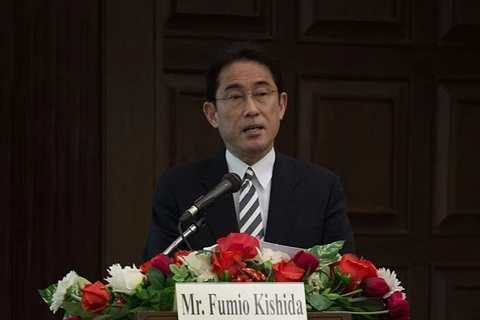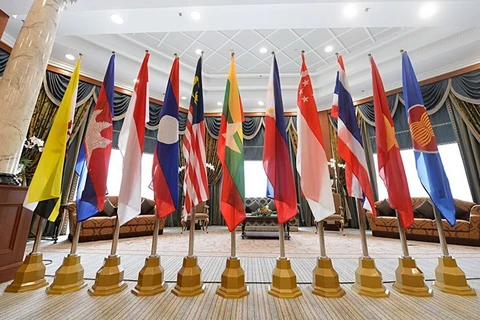Vientiane (VNA) – Senior officials of the ASEAN nations, the bloc’s partners, and the East Asia Summit (EAS) countries scrutinised the regional cooperation as well as security challenges during their meetings in Luang Prabang, Laos, on May 6 – 7.
The ASEAN Senior Officials’ Meeting (ASEAN SOM), the ASEAN Plus Three Senior Officials’ Meeting (APT SOM) and the EAS Senior Officials’ Meeting (EAS SOM) were to carry out the decisions approved at the summits in Malaysia last November, review the action plans, and prepare for high-level meetings in late 2016.
At the ASEAN SOM, the grouping’s countries pledged to implement the ASEAN Community Vision 2025 in an effective and substantive manner.
They agreed that to ensure the success of the ASEAN Community, it is important to continue maintaining and upholding the bloc’s central role while boosting its solidarity and consensus, especially in the problems affecting the regional peace, security and development.
The ASEAN officials called for the strengthening of ASEAN’s cooperation with its partners and the establishment of partnerships with more countries. They also discussed ways to improve the effectiveness of the ASEAN-initiated forums and to promote the bloc’s centrality in the shaping of the regional architecture.
At the APT SOM, the ASEAN senior officials met with their peers from the Republic of Korea, Japan and China. They altogether underlined that the ASEAN+3 cooperation process is the main framework to enhance the regional connectivity towards the long-term target of an East Asian community.
They agreed to speed up the implementation of the ASEAN+3 Cooperation Work Plan 2013 – 2017 and consider the drafting of a similar plan for the next period. They also stressed the need to continue carrying out the recommendations of the East Asian Vision Group, particularly in the matters of common concern such as financial stabilisation, connectivity, infrastructure, small- and medium-sized enterprise development, and response to non-traditional security challenges.
Meanwhile, officials from ASEAN and the eight partner countries (China, the US, Russia, the Republic of Korea, Japan, Australia, New Zealand and India) convened the EAS SOM.
They said the EAS remains a forum for their leaders to discuss strategic issues. They welcomed the implementation outcomes of the Kuala Lumpur Declaration on the 10th anniversary of the EAS, adopted in November 2015.
In particular, they hailed the measures to realise the leaders’ decisions such as promoting the role of the country holding the EAS chair, enhancing the exchange between the Committee of Permanent Representatives to ASEAN with the ambassadors of the non-ASEAN EAS nations in Jakarta (Indonesia), and setting up an EAS division under the ASEAN Secretariat.
The participants concurred in fostering cooperation in the EAS’s prioritised areas like energy, education, health care, environment, and finance. They will also boost coordination between the EAS and other ASEAN-led forums such as the ASEAN+1, the ASEAN+3, the ASEAN Defence Ministers’ Meeting Plus, and the ASEAN Regional Forum.
During the three meetings, the officials also mulled over regional and international issues of shared interest, pointing out the increasingly complicated situation that strongly affects the countries in the region, including the emergence of traditional and non-traditional security challenges like the East Sea issue, terrorism, proliferation of weapons of mass destruction, navigation security, climate change, and migration.
With regard to the complex developments in the East Sea, many of the nations voiced concern about threats to peace and stability in the region. They urged the relevant sides to settle disputes peacefully, exercise self-restraint, and not conduct militarisation or threaten to use force. The concerned parties should also adhere to international law, including the 1982 UN Convention on the Law of the Sea (1982 UNCLOS) and legal and diplomatic processes, effectively carry out the Declaration on the Conduct of Parties in the East Sea (DOC), and push for a code of conduct in the waters (COC).
At the SOMs, Vietnamese Deputy Foreign Minister Le Hoai Trung emphasised that Vietnam is committed to working closely with other ASEAN nations to implement the action lines of the ASEAN Political – Security Community Blueprint 2025. It will continue proactive and active moves to help maintain ASEAN’s central role and reinforce the bloc’s solidarity and consensus in solving the strategic matters in the region, in ASEAN’s cooperation with partners, along with in the shaping of the regional architecture on the basis of the ASEAN-led forums.
He also underlined the importance of further promoting the effectiveness of the ASEAN apparatus’ operations, and the ASEAN Secretariat’s capacity so as to better satisfy the growing connectivity demands.
He agreed with other ASEAN+3 and EAS officials on the cooperation outcomes between the grouping and the partners. He asked for strengthening all-faceted and result-oriented cooperation between ASEAN and the partners, especially in boosting the regional connectivity, response to such challenges as terrorism, climate change, food security, energy, and navigation security and safety.
Trung, who led the Vietnamese delegation to the meetings, said his country supports the enhancement of the EAS as an important part of the regional architecture, which ASEAN plays the central role. It also advocates for the EAS’s active contributions to peace, cooperation and development in the region.
Touching upon the global situation, the Deputy Foreign Minister stressed that although peace, cooperation and development are the main trend, the Asian-Pacific region is undergoing profound strategic changes that have impacted all countries, in both positive and negative ways.
He shared other countries’ concern about the complicated developments in the region, including the East Sea issue.
The official highlighted the common responsibility and interests of all countries in ensuring regional peace and stability, complying with international law, including the 1982 UNCLOS, resolving disputes peacefully, not using or threatening to use force, striving to effectively carry out the DOC and pushing for the COC.-VNA


























